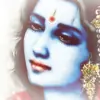Originally posted by: Animagus_Shiri
I don't think many people know this:
Abhimanyu was actually the soul of a Daitya named Kalyavana. He was an incarnation of a powerful demon who was capable of killing Lord Krishna at some point. Abhimanyu’s only weakness is his partial knowledge of Chakravyuh.
Hence the Chakravyuh was indeed launched to kill Abhimanyu as this was the only way by which he could attain Moksha. Therefore, Krishna never imparts the knowledge of how to come out of Chakravyuh to him.
You can share facts about Mahabharat that you think very few people know about in this thread.
In which Mahābhārata do you find this story?
I know the Bhīla Bhārata story that Iko Dānava was on his way with a cage to capture Kṛṣṇa, who had killed all of the Dānavas after luring them to marry Yādava girls. Kṛṣṇa disguised himself and said to Iko Dānava, this cage is too small for fat Kṛṣṇa ... well, maybe if it's big enough for you, it will be big enough for him! Iko Dānava got into the cage, Kṛṣṇa shut the door tight, and he kept the cage hidden in the seventh level cellar. One day, Kṛṣṇa told his sister Hodrā, while I am out, don't go into the cellar. Out of curiosity, Hodrā went down all the way to the seventh level, and opened the cage. Iko Dānava had been starving, and he had wasted away until he was only the size of a bee. He flew into Hodrā's mouth, and entered her belly. She became pregnant and was writhing in pain.
Kṛṣṇa noticed that his sister was pregnant, and asked her what had happened. Upon learning that Hodrā had opened the cage and Iko Dānava was reincarnating in her belly, he decided to abort her pregnancy. Kṛṣṇa began to recite the Cakra Veda, the method for breaching seven concentric forts in battle, and he directed this knowledge against the embryo, stripping away six layers of tissue in an effort to kill it. He asked Hodrā to hum at intervals to let him know that her pain was lessening. When Hodrā was relieved of pain and fell asleep, Kṛṣṇa heard a different voice humming from her womb. Iko Dānava was not dying; rather, he was absorbing the knowledge that would make him an invincible warrior! So, Kṛṣṇa stopped his recitation without explaining how to breach the seventh fort made of cow-dung.
Iko Dānava continued to grow in Hodrā's belly, and Kṛṣṇa knew that he would have to get his sister married. He asked Arjuna to marry her, and although Arjuna knew that Hodrā was pregnant, he could not disrespect Kṛṣṇa. So, Hodrā had a baby boy, who was known as Arjuna's son, and his name was Bālo Emmanta. He had forgotten his identity as Iko Dānava, but his Dānava nature and his knowledge of Cakra Veda made him an unequalled warrior.
When Indrāṇī left Indra, she came to Bālo Emmanta and asked him to make her his paramour, and he did so without fearing her divine husband. When the five Pāṇḍavas and their seventy-eight Kaurava cousins declared war, Bālo Emmanta's bride pleaded with him that it's a sin for a warrior to die as a virgin. Bālo Emmanta did not turn around to look at her; he kept marching while crying tears of blood.
On each of the first six days of war, Bālo Emmanta breached one of the Kaurava forts, until only the innermost fort of cow-dung was left. As he did not know how to breach it, but Bhīma did, Bālo Emmanta stood watching him, leaning his head on his bow. Kṛṣṇa turned himself into a mouse and gnawed through the bow-string. The bow snapped through Bālo Emmanta's neck, decapitating him, and that was the end of Iko Dānava.






























